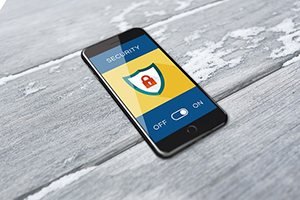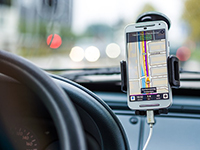Have a safe and wonderful Memorial Day weekend!
 The U.S. Department of Justice’s Bureau of Justice Statistics reports that most burglaries occur during the summer months (and while people are away). While some burglars enter your home, others are interested in soft targets, the items stored outside of your home. One in three homeowners do not protect their soft targets, but you can with these tips.
The U.S. Department of Justice’s Bureau of Justice Statistics reports that most burglaries occur during the summer months (and while people are away). While some burglars enter your home, others are interested in soft targets, the items stored outside of your home. One in three homeowners do not protect their soft targets, but you can with these tips.
-
- Vacant Properties
Thieves and vandals typically target vacant homes as they steal scrap metal or take other items to sell. If you’re on vacation, keep your windows and doors locked. Install outdoor motion activated lights and use a timer to turn on indoor lights at random times, too. You can also install a video camera that allows you to monitor your home while you’re away.
- Vehicles and Loose Items
Experienced car thieves can steal a vehicle in less than 10 seconds. Always keep your car locked inside the garage or make sure the alarm is turned on and install an anti-theft device that disables the ignition or locks the steering wheel. You should hide any loose items, too, including electronics, garage door openers, toll booth passes and parking garage passes, either in the glove box or trunk.
- Unlocked Sheds and Garages
Tools and lawn equipment are easy to resell. Always lock your garage, including windows, even if you’re working in your lawn. Be sure your valuable tools and equipment are stored inside the shed or garage, too.
- Sports Equipment
Whether your summer activities include baseball, kayaking or tennis, resist the urge to store your sports equipment outside. Secure it safely in a locked garage or shed, in a locked bin or in your vehicle’s trunk.
- Bicycles
Ideally, you should store your bike in a locked garage or shed. If you have to store your bikes, don’t use thin bike chains and wheel locks that are easy to unbolt or cut. A heavy chain threaded through the bike’s wheels and frame and a thick padlock are more secure.
- Air Conditioning Units
Your outdoor air conditioning units contain copper coils and other metal piping that thieves can scrap for cash. Install a bright security light that’s motion activated near your outdoor AC unit or install a locked fence around it.
- Pool Pumps
Pool pumps are easy to resell. Remove the pool pump and store it inside during your vacation. If that’s not possible, install a bright, motion-activated security light near the pump. You should also install a fence around your pool and keep it locked at all times.
Protect your home from thieves when you take steps to protect these seven soft targets. Be sure your homeowners or renters insurance policies are up to date, too, as you protect your home and possessions.
Read more
 Millions of Americans take to the water each year during boating season, traveling the coastlines, rivers, lakes and canals. The watercraft range from simple rowboats to jet skis to small motorboats to luxury yachts. Boat owners spend significant amounts of money buying and maintaining their boats.
Millions of Americans take to the water each year during boating season, traveling the coastlines, rivers, lakes and canals. The watercraft range from simple rowboats to jet skis to small motorboats to luxury yachts. Boat owners spend significant amounts of money buying and maintaining their boats.
The need for insurance protection when the boat is on the water is obvious, but many boat owners question the need for it during the off-season. However, insurance is just as important when the boat is in storage as when the owner is using it.
A typical Boat insurance policy provides a package of coverages, including:
- Damage to the boat, motor, and trailer
- Damage to portable property used in the maintenance and operation of the boat, including things like anchors, life jackets, oars, tools, skis and surfboards, lights, and fire extinguishers
- Damage to other types of property, including sports equipment, clothing, and other personal effects
- Damage to equipment on shore, such as boat covers
- The cost of recovering a sunk or stranded boat
- The cost of emergency service and towing
- Damage to non-owned or substitute boats
- Loss of fishing tackle
- Liability coverage for injuries or damages for which the boat owner is legally responsible
- Coverage for injuries the boat owner or others on the boat suffer in an accident with an uninsured watercraft
A boat owner will need these coverages if their boat gets into a collision with another boat, or if thieves steal scuba gear from it, or if fire damages the motor. However, losses are still possible while the boat is out of the water. Progressive Insurance reports that nearly two out of every 10 boat claims it receives from northern states occur between Labor Day and Memorial Day, when most owners are not using their boats much.
Some examples of losses that could occur:
- The building which houses the boat during the winter burns to the ground.
- Vandals damage the boat in the middle of the night while it’s in the owner’s driveway.
- A neighbor’s child, playing in the owner’s yard, runs into the boat stored there and injures his head.
- Someone steals the boat and its trailer from the yard at a repair shop.
- While the boat is stored in the yard, heavy snow melt causes a flash flood that damages the boat’s interior, including the mechanical system and the radio.
Some insurance companies offer “disappearing deductibles,” where the deductibles for collision and damage losses from other causes decrease by a certain amount for every claim-free year. Those companies will grant this benefit only to boat owners who keep their insurance continuously in force with them.
One of our professional insurance agents can provide advice on the types and amounts of coverage a boat owner needs. We can also recommend insurance companies that have expertise in boating, good claims-paying practices, and reasonable prices. Insuring a boat all year round can be expensive, but compared to the cost of a large uninsured loss, it may well be worth the cost.
Read more
You and  your company can make several preparations regularly to help prevent a cyber attack.
your company can make several preparations regularly to help prevent a cyber attack.
Host an Educational Event
Begin planning an open house, expo, lecture, or other educational event that focuses on cybersecurity. Depending on your company, you may decide to focus your educational efforts on information that will benefit senior citizens, college students or families. For example, your IT specialist could present advice that helps consumers avoid cybercrime, or you could show customers how to implement security protocols on their electronic devices. Get creative as you prepare to raise cybersecurity awareness during an educational event.
Train Employees
Cybersecurity training should occur year-round, but your employees may be especially receptive to security tips during a month that’s focused on raising awareness. Take advantage of this annual opportunity to discuss topics like choosing secure passwords, securing electronic devices used for work and managing email safety. Or choose a different topic based on your unique needs.
Focus on Different Weekly Topics
Some topic ideas include:
- Online safety at home.
- Training for a cybersecurity career.
- Ensuring online safety at work.
- Safeguarding critical infrastructure throughout the nation.
Your company can prepare to discuss these weekly topics during your events, through customer newsletters and on social media.
Utilize Your Social Media Influence
If your company has a large social media following, you have a powerful platform to raise awareness for cybersecurity. You can write blog posts that outline the importance of cybersecurity, share information about how to join the cybersecurity workforce or detail the ways your business protects data. Also, prepare infographs and other visual aids that discuss online safety tips.
Partner with Other Companies
Your company can partner with other businesses as you increase cybersecurity awareness. Share the latest cybersecurity information, create resources that educate the public about cybersecurity or host an online safety seminar together.
Check your Cybersecurity Insurance Coverage
Cybersecurity insurance protects your business in many circumstances. Review your needs with your Scurich insurance agent as you ensure you have the correct amount of cybersecurity insurance for your company.
Consider taking these steps now. They give you the tools you need to raise cybersecurity awareness among your employees, customers and community.
Read more
As Americans take to the roadways in record numbers (post pandemic), here are some safety pointers that may be useful to you and your loved ones.
 In your vehicle, it’s easy to feel like you’re secluded from everyone else on the road. Your vehicle is one of many on the road, though. Above all else, you must always prioritize safety and use these etiquette tips.
In your vehicle, it’s easy to feel like you’re secluded from everyone else on the road. Your vehicle is one of many on the road, though. Above all else, you must always prioritize safety and use these etiquette tips.
Obey the Rules of the Road
Every rule of the road applies to you, so obey the speed limit and stop, yield and merge signs. Your agenda is never more important than safety.
Be Considerate
You share the road with other drivers, bikers and walkers, so be considerate. Give other drivers the right of way, let other drivers pass if they’re in a hurry and yield to pedestrians. Don’t demand your own way or give into road rage. Show consideration and make the commute safer for everyone.
Take Turns
When the road narrows from two lanes to one or traffic slows for an accident, take turns merging. It’s better to let someone go in front of you than to cause a pileup.
Turn on Your Headlights
Your vehicle’s headlights allow you to see clearly as you drive at night or in certain types of weather. Remember to turn off your high beams when another car approaches. Also, don’t use your headlights as aggression toward another driver.
Use Your Horn Sparingly
The horn in your vehicle is designed to alert other drivers of dangers. In certain occasions, it’s appropriate to honk your horn, but use it sparingly and remember that laying on the horn is poor manners and a sign of aggression.
It’s appropriate to lightly beep your horn when:
- The light turns green and the driver in front of you is distracted
- It’s the other driver’s turn at the intersection
- Another driver is ready to cut you off because you’re in their blind spot
Do not use your horn to:
- Scold drivers who are speeding or being unsafe in other ways
- Vent your frustrations
Respect Emergency Vehicles
Ambulances, fire trucks and police cars also use the roadways. When you see flashing lights, slow down and pull off to the right side of the road. Wait for the emergency vehicle to pass and then merge back into traffic.
Pull Off the Road if You’re in a Fender Bender
Minor fender benders do occasionally happen. Instead of stopping your vehicle in the middle of the road, pull off the road safely to assess damage and discuss the next step, which may include exchanging insurance information, with the other driver.
Report Emergencies
When you pass a vehicle with its emergency lights on, stop and offer assistance. You can also call 911.
Etiquette goes a long way toward maintaining roadway safety for everyone. Share the road, remain calm and use your manners as you drive safely.
Read more
 The U.S. Department of Justice’s Bureau of Justice Statistics reports that most burglaries occur during the summer months (and while people are away). While some burglars enter your home, others are interested in soft targets, the items stored outside of your home. One in three homeowners do not protect their soft targets, but you can with these tips.
The U.S. Department of Justice’s Bureau of Justice Statistics reports that most burglaries occur during the summer months (and while people are away). While some burglars enter your home, others are interested in soft targets, the items stored outside of your home. One in three homeowners do not protect their soft targets, but you can with these tips.
 Millions of Americans take to the water each year during boating season, traveling the coastlines, rivers, lakes and canals. The watercraft range from simple rowboats to jet skis to small motorboats to luxury yachts. Boat owners spend significant amounts of money buying and maintaining their boats.
Millions of Americans take to the water each year during boating season, traveling the coastlines, rivers, lakes and canals. The watercraft range from simple rowboats to jet skis to small motorboats to luxury yachts. Boat owners spend significant amounts of money buying and maintaining their boats. your company can make several preparations regularly to help prevent a cyber attack.
your company can make several preparations regularly to help prevent a cyber attack. In your vehicle, it’s easy to feel like you’re secluded from everyone else on the road. Your vehicle is one of many on the road, though. Above all else, you must always prioritize safety and use these etiquette tips.
In your vehicle, it’s easy to feel like you’re secluded from everyone else on the road. Your vehicle is one of many on the road, though. Above all else, you must always prioritize safety and use these etiquette tips.